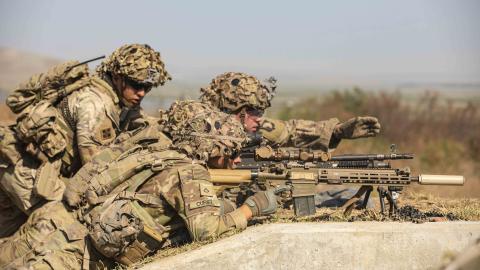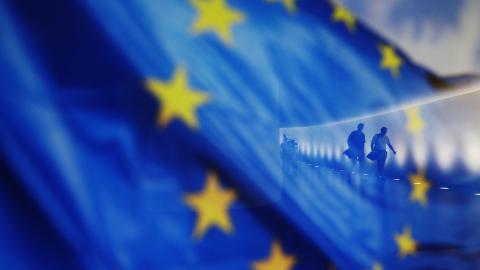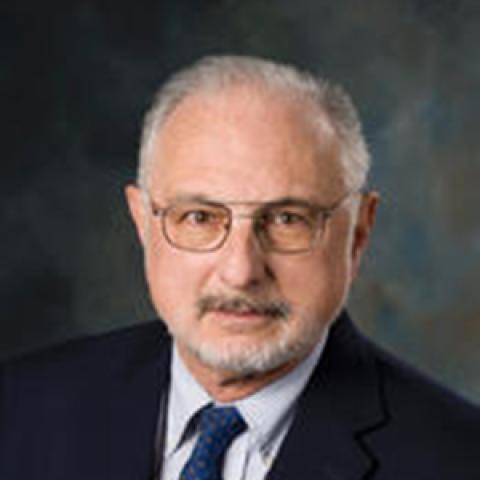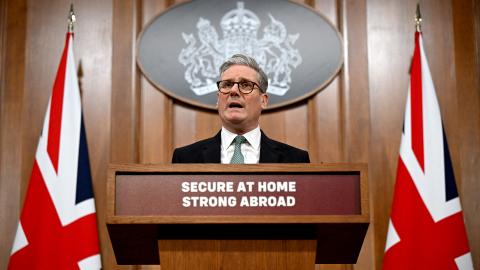
In-person attendance is by invite only.
Event will also air live on this page.
Inquiries: daltman@hudson.org
NATO in the New Era of Collective Defense
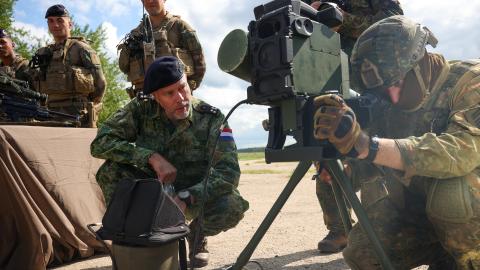
In-person attendance is by invite only.
Event will also air live on this page.
Inquiries: daltman@hudson.org
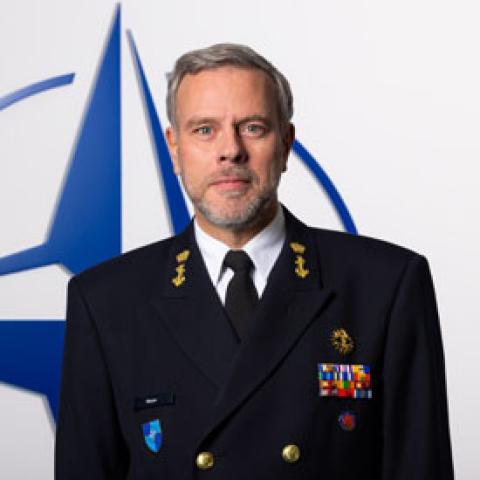
Chair, NATO Military Committee

Senior Fellow and Director, Center on Europe and Eurasia
Peter Rough is a senior fellow and director of the Center on Europe and Eurasia at Hudson Institute.

Senior Fellow
Nadia Schadlow is a senior fellow at Hudson Institute and a co-chair of the Hamilton Commission on Securing America’s National Security Innovation Base.

Please join NATO Public Forum think tank consortium members Hudson Institute, the Center for a New American Security (CNAS), the Atlantic Council, the German Marshall Fund of the United States, and GLOBSEC for a conversation with NATO Chair of the Military Committee (CMC) Admiral Rob Bauer, the alliance’s highest-ranking military official.
Admiral Bauer is visiting the United States in the lead-up to the Washington summit to talk about the alliance’s strengths and speak frankly about its challenges. As he told the Wall Street Journal in April, “Politicians always talk about cooperation, but in practical terms they don’t have a clue.”
The CMC has also made it a point to regularly meet with key private sector figures to improve NATO’s industrial base. As the Journal described his thinking, “the West needs not only to boost military production; it must fundamentally rethink what defense means, starting with the private sector.”
Event Transcript
This transcription is automatically generated and edited lightly for accuracy. Please excuse any errors.
Peter Rough:
Great. Good morning everyone, and welcome to Hudson Institute. Hudson was formed in, or founded in 1961 by the legendary strategist, Herman Kahn in Croton-on-Hudson. Our headquarters since then has moved to Washington DC where we take as a mission promoting American leadership in service of a secure, free and prosperous future. My name is Peter Rough. I'm a senior fellow and director of The Center on Europe and Eurasia, which we launched just 18 months ago or so with an address by NATO Secretary General Jens Stoltenberg, which makes it a particular pleasure for me to introduce Admiral Rob Bauer, the CMC, the chair of the military committee at NATO, the senior-most military official in the alliance. He'll be joined today in conversation with Nadia Schadlow. Nadia is a senior fellow here with a distinguished career in national security strategy making, including serving as deputy national security advisor and playing a major role as an architect behind the 2017 National Security Strategy.
Hudson Institute is also pleased to be part of the consortium of think tanks, putting on the public forum, which is the civil society event taking place concurrent to the NATO Summit next month, nearly a month away, July 10th and 11th. And since one of our friends from the White House who's playing a coordinating role for that summit is here today, I want to reiterate and emphasize to everyone, please watch it online. We want as many eyeballs on the public forum as possible, and we look forward to the discussions that we'll have there with the consortium members, which include The Atlantic Council, the German Marshall Fund, the Center for New American Security, and the Bratislava based GLOBSEC. I guess now it's in Prague, along with Hudson. Thanks to those think tank partners for co-branding today's event and some of whom have joined us here in person. With that, I will kick it over to Nadia for a conversation with the CMC, and I look forward to hearing what you have to say, sir.
Nadia Schadlow:
Thanks so much, Peter, and thanks so much Admiral, and it's great to be here. And thanks for everyone in the audience. I thought the Admiral and I will have a conversation and then we'll open it up to questions from the audience. So please tee up some questions and then we'll break before lunch before one o'clock, so you'll have time to get some lunch and to speak to the Admiral one-on-one as well. So let's start. First of all, I think it's great to have a Dutchman in your position today in NATO. Why? Because you're-
Rob Bauer:
Great earrings, by the way.
Nadia Schadlow:
Oh, thank you. Orange. Because the Dutch are known for their directness and it's never a better time for directness. And I think you've been very direct in a very necessary way, both in speaking to NATO partners as well as to European and American publics. So some of the things, for instance, over the past few months, I've heard you say, “If Russia wins this war, it's just the beginning, not the end of our problems.” You've also called it the most dangerous time in potentially the 50 years that we faced, or at least in decades. And you've also called on European and American publics to think about what being on a war footing means. So I think these are really direct statements and necessary statements, and in reading a lot of what you've written and spoken about, it seems to me there are four categories of issues and I'd like to talk about them today.
The first are NATO capabilities and how much you've worked on to develop those capabilities with our allies, the alliance. The second is the subject of political will, which I hinted at a little bit in terms of war footing. A third is the character of war and how it's changing given what's happening in Ukraine today. And a fourth is more generally about what's happening in Ukraine and I'd like to talk about that, and I'm sure you have questions there. So why don't we start with the military transformation of NATO and what you've done over the past few years to increase and improve NATO's capabilities, maybe its regional plans. Could you tell us about that?
Rob Bauer:
Yeah. Thanks for having me because it's great to be able to explain things and to have a discussion and answer questions. I don't know whether there's time for that later on, but looking forward to that as well. So to put things in perspective, early eighties, we changed our ways because we thought the threat was gone, because we tried to become partners with Russia for 20 years and they were part of the Partnership for Peace program. And then they started to behave differently. They annexed parts of Georgia, they annexed Crimea, they attacked the Donbas region, and in 2022 there was the full-fledged invasion. So after the annexation of Crimea in the military, I was chief of defense at the time, the chiefs of defense decided to rewrite the NATO military strategy. And we did that based on not something new per se, but it was new for a lot of people.
That was based on two threats, which is Russia and the terrorist groups. And that work was finished in 2019, and then we wrote two different strategies. One was on how to deter and defend against those two threats. And the second one is to do basically the same, but when then looking ahead 20 years. So this was the Deterrence and Defence of the Euro-Atlantic strategy, the DDA, you probably have heard of that. And then the other document was the NATO Warfighting Capstone Concept, which is the NWCC. And then based on those strategies, we started to write the plans, the operational plans for the Joint Force Commands. We have three of them. One in Norfolk, Virginia who looks after the Atlantic Ocean, Nordic, the Arctic over Europe and the to-be Nordic nations, which is Denmark, Norway, Sweden, and Finland.
Then there is the Joint Force Command Brunssum, which looks after the central part of Europe. And then there's the Joint Force Command Naples in Italy that looks after the southern part of Europe with the Mediterranean and the Black Sea. And these plans were finalized just before the summit, and the leaders agreed to them. And out of those plans, we basically had a much better . . . Those plans described what we should be able to do to deter and defend. And then out of those plans, we were able to derive what capabilities do we need collectively to perform all those tasks in those plans. And that is the force structure requirements, that is the sum of all the capabilities in space, cyber, land, air, and maritime.
And then we knew we had to do a number of things with regard to the command and control of NATO. And then we also knew that we needed more people at a higher readiness because the big difference between crisis response operations, which we have been doing for more than 20 years, like in Afghanistan, is that time was on our side. We decided to go there. For how long, what is the mission, what is the . . . But if you are attacked by an adversary, they decide the timeline, so then you have to be ready. And if you're not, you might lose. So more readier soldiers, more capabilities and the plans, and then we have to exercise against these plans. Those are the things we are working on between decisions in Vilnius and the summit here in Washington in July.
So in terms of our readiness and the discussion on the capabilities is that we now have a much better understanding of what we need in terms of people and capabilities as a result of those plans against these threats. And the work that we need to do is that we, of course, we have a set of capabilities and we have people so it's not that we start from a white sheet of paper, but we need to . . . And we know the delta between what we need and what we have, and therefore we know what we have to buy. And now we also know much better why we need the 2percent as a minimum, which is now a decision in the Vilnius Summit in terms of spending against the GDP. So it's 2 percent or more. And in the World Summit it was going towards 2 percent. And the reason for that is because we know what we have to buy. So there's a much closer direct connection now between operational planning, defense plans, and therefore what is the money we need for that.
Nadia Schadlow:
Right. And that really goes in some ways, those capabilities to Article 3 of the Alliance, which discusses actually how individual member states need to develop and enhance their own capabilities. So actually, yeah, just to call out one of my colleagues, Luke Coffey wrote a great piece about how to get NATO countries to that point you needed to bring in finance ministers, and we can talk about that separately-
Rob Bauer:
Yep, I agree. I agree.
Nadia Schadlow:
. . . but I do think it's important because ultimately it's about defense budgets and it's about what individual countries do.
Rob Bauer:
But it's not only about money.
Nadia Schadlow:
It's about right. It's about training and what you need the systems for.
Rob Bauer:
And more. Because we're now at the point in my career where money is not necessarily the biggest problem because I think we are now at the point where we starting to understand that the production capacity in our part of the world is not good enough. It's not big enough to basically buy all the stuff and produce all the stuff that we need. So we have the money now, but we don't have the production capacity to get it fast enough.
Nadia Schadlow:
Right. So that's the-
Rob Bauer:
That's he next problem.
Nadia Schadlow:
Right.
Rob Bauer:
That's with every chain, the weakest link.
Nadia Schadlow:
Right. And you've tried in the past. In the past, I guess when you were the Dutch MOD, you tell a story once about how you were working with your Belgian and German counterparts to buy frigates together. Let's do this together. Let's have a joint order so that we can achieve scale a little bit more effectively. And that really didn't go anywhere. As an aside, when I first started at the Pentagon many years ago, I thought I wanted to focus on international armaments' cooperation. I realized after about three months, there was really no international armaments' cooperation, so I switched. But it was that story of how do you standardize across Europe, how do you manage the tensions with individual national contractors? At one point you said there's something like 170-
Rob Bauer:
Two.
Nadia Schadlow:
. . . 172 different systems. So are we moving ahead in this way? Are you making progress on something that you've worked on for a long time in cajoling?
Rob Bauer:
I think there's a lot of talk about it, but there's not a lot of work yet. There's a lot of politicians that talk about interoperability, even interchangeability. But if I say to them, okay, but then that means the following things, that we stop protecting your own industry. It's not only Europe that does that, by the way, it's also in the US. So there's a lot of nations that protect their own industry, and that's fine in itself, but if you want to achieve the things we're talking about here, we need all the capacity that is available. And once we have achieved that, you might revert to national protection of industry. But for now, I should say, let's stop doing that. Make sure that we have joint procurement. Let's make sure that we use all the capacity that is available and produce everything that we need, not only to improve ourselves in accordance with those plans we talked about, but also to help Ukraine win this war.
Nadia Schadlow:
Right. And to look to different ways also in how to improve and produce that capacity, not necessarily investing in old infrastructure, some of which is from World War II and the Cold War, but looking forward with new systems, advanced manufacturing, modularity, new approaches to achieving scale.
Rob Bauer:
Absolutely. But it is a wider discussion. Again, it's not just the defense industry, it's also the financial institutions. It's the banks, because you need investors to build those new factories. And then you run into things like, especially in Europe I think, and Canada, where there's a discussion on is investing in the defense industry ethical? Are we doing things against the sustainability goals? Because you can destroy things with ammunition, but I would argue that if we have a war, you have a bigger sustainability problem, than if you make sure that we are strong and able to deter and therefore actually to prevent a war. Because I think that is still the aim in the alliance. I'm not looking for war. We're looking for a strong deterrence in order to make the Russians and the terrorist groups think 10 times before they actually start doing anything against us.
Nadia Schadlow:
Have you seen a shift over the past two years in the business community's approach to investments in these areas or is it hard to tell yet?
Rob Bauer:
I see a shift. It is too slow still. I think we need to have a debate about societal will, because I think for a long time we have sort of outsourced external security to the armed forces and internal security to the police. And a lot of people say, don't bother us with it. Well, you're a part of the solution, ladies and gentlemen, whether you like it or not. And because if you get into a war, you need more people because soldiers die, soldiers get wounded. So if you have professional armed forces, that's good, but fairly soon into a conflict, you will run into a problem of many. And therefore, I will look to society. You are part of the solution and you cannot turn away then and say it's your problem. No, no, it is our problem. All of us want more security. And so it starts with that. Then the second is the private sector. The private sector for 80 years didn't have to think about security basically, because it was there. So a lot of people in private sector don't go to bed and wake up in the middle of the night and think, is my factory there tomorrow morning? People in Ukraine, CEOs in Ukraine wake up in the middle of the night thinking about that. So the sort of idea that if you don't have to think about this for 80 years, it's not part of your considerations and therefore security and defense was sort of something, yeah, it was there, but the private sector didn't necessarily feel connected to it and didn't feel responsible to be part of the solution.
So I hear shareholder value and I hear long-term demand signals and that's fine. I understand people need to earn money, but you should become more part of the values discussion because you are part of the solution in terms of this whole-of-society approach. And if the global economy means that you do not belong anywhere actually because whether your factor is in Cambodia or Vietnam or in the United States or in the Netherlands and you don't care actually what the political system is where you have your factory, then I think that might have to change because there is a possibility that we will end up having two parallel rules-based international orders if we continue this route. And then you have to decide as private sector to which part of the world are you belonging.
Nadia Schadlow:
Well, before we shift to some of the current issues with the war and the character of war. One more question on capabilities. How do you see the evolution of AI and NATO as NATO countries are thinking about improving in their capabilities? So what worries me a little bit is we're seeing differences. How does AI differ across the alliance? How will that matter to integration to interoperability if countries have different capabilities in the AI domain or are they less different than I think or how are you thinking about that? Will it make it more difficult to operate?
Rob Bauer:
You always have had, and you will always have different pace in technology development in the alliance. So I don't think that is something we can solve. If you compare the U.S. with smaller nations in the alliance, then they will never be the same in terms of research and development and the industrial complex. And so that is not a problem you can solve. And it's not a problem per se. So I think what you will see is there is differences in terms of how far advanced the U.S, UK, France, Germany, Italy are, Spain maybe, Netherlands in terms of R&D, and then the implementation into the armed forces. And the implementation can be based on an American development or a UK development or whatever. So then of course you need to talk about standards. And standardization in software for example, that is a discussion to be had still.
I think probably the standardization on the ability to exchange data is probably the best sort of solution because if you try to connect all these systems physically, then it's not going to happen. So I think that's where the efforts are at the moment in terms of technology to make sure that we are able to exchange data, given certain labels and that we agree on that. Given also the fact that if you look at multi-domain operations, which is the next step after joint operations, is allowing not only to have all the data that is available in the military domain to be used by all, but also the data that is outside the military domain. Because if you look at all the instruments of power, multi-domain operations is basically not only in the military realm, but it's basically looking at economic, financial, et cetera. So that is very difficult and it's probably not for all the nations to have that at all levels.
Nadia Schadlow:
Something to look for.
Rob Bauer:
Yeah.
Nadia Schadlow:
So let's turn to the current state of affairs of the war, what's unfolding. Let's start with some of the most recent news about reducing restrictions on deep strike. And can you talk a little bit about that, how that's likely to impact the course of the war, what your views are?
Rob Bauer:
Let me start by saying that there's two aspects here. One is the military logic and the legal authority to actually attack your attacker. By the law on armed conflict, it is allowed to attack the attacker. If Russia attacked, not if, Russia has attacked Ukraine and it's an illegal war, then you are allowed by the law of armed conflict to attack Russia. And militarily, it's logic because if you can force your opponent back and his logistics away from the front, then it becomes more difficult for them to sustain the fight. But it's not only the logistics in terms of immediate fuel and ammunition and things like that, but it's also of course the whole industrial complex that supports the war. So it's about refineries and it's about factories that built bombs and it is about command centers and it is about air bases where the aircraft leave from to then attack your nation. So for those two reasons, it is allowed and it is militarily logic.
Nadia Schadlow:
But we didn't do it until recently.
Rob Bauer:
Well define we. But yeah, that that's part of the discussion because not all nations have put restrictions on the weapons systems. And the second bit is that if a nation gives away weapons systems, they have the right, whether I agree with it or not, whether Ukraine agrees, well Ukraine had to agree with it. So some nations said, “I give you these weapons systems under the following conditions.” And if Ukraine has said, yeah, good to go and they're living up to that, then that's smart because otherwise they would not have been given the next round.
So that is a deal between two nations and that is the right of the nation that gives the weapons systems because they are assessing the risks for themselves, for NATO, for, I don't know, whatever. And so that is their right. And if Ukraine agreed to it, then the outcome is the outcome. So it's two different things. So you have the sets of agreements with certain weapons systems and some nations do and some nations, and then you have what is legally possible and allowed and what is militarily logic. And I think if the two worlds come together, that is the ideal for Ukraine.
Nadia Schadlow:
And do you think now then going forward the course of the war, this will have a significant difference in the course of the war?
Rob Bauer:
Well, it's always difficult and dangerous to talk about significant because-
Nadia Schadlow:
What's significant?
Rob Bauer:
Yeah. It is very difficult to predict how significant is it going to be. So is the F6 going to change the course of the war? I don't know. Is it important? Yes, it is important. We thought before the war that cyber was going to be significant. Well, actually it hasn't changed the course of the war, cyber, for example. A lot of people thought cyber is going to change the character of war, and it hasn't so far, it hasn't so far. And in many ways we see, I would say the war in Ukraine is a land battle more than anything else because air and maritime has not placed a significant role. So it's primarily a land battle. It's not a joint battle in many ways. And the other thing is that we see this interesting combination of World War I tactics, trenches. The trenches are back, artillery barrages, waves of infantry used to find the shooting positions of the enemy. That's World War I. And then there's World War, not World War III, but 21st century drones, AI, cyber, hypersonic missiles, and it's happening at the same time.
Nadia Schadlow:
My colleagues have called that, Mike Duran and John Katsapalu, Star Wars meets Mad Max, essentially. Dystopian.
Rob Bauer:
Yeah. And I've used the terms, it's not only bits and bots, but it is still mud and blood.
Nadia Schadlow:
Mud and blood. Yeah. But to go back to now loosening restrictions on deep strikes and how historians will look back, it seems sort of two phrases or words have characterized much of the past two years, one has been incrementalism, both in terms of weapons delivery to Ukraine and a political incrementalism of being unsure of what we want. And then another has been fear of escalation. Do you think that's fair? That those are two characteristics of the war and how it's unfolded?
Rob Bauer:
Yeah, I think it's fair to use those characteristics. However, do I say, if you look back over the last two and a half years and you then have an opinion, that is always much easier than to look ahead two and a half years and oversee the consequences of everything you say and do. So looking back and say, well actually that was stupid to do it that way, might be true, might be true, but it's not necessarily fair for the people that had to make those decisions.
Nadia Schadlow:
At the time.
Rob Bauer:
So I am never going to say it's simple. If you are in the position of the President of the United States or the Chancellor in Germany or the President in France or whatever political leader, and you give away a weapons system and there is a logical discussion about, so what are the risks of escalation? Is there a risk of escalation of getting NATO or my country involved in this war? Is that worth it? Do we want that? Do we want to prevent that? And if the outcome of that discussion is we have to give it with restrictions, then that is in a way understandable.
Nadia Schadlow:
Right.
Rob Bauer:
So I think it is understandable that people looking back will have an opinion, but we have to be fair that if you are in the position of making the decision, that it's not that easy if you look ahead.
Nadia Schadlow:
Right. Well one last question and then I'll turn to the audience. So what are some of the lessons do you think that China is drawing from the war in Ukraine and how it's unfolding?
Rob Bauer:
One is not a lesson, but one is an advantage.
Nadia Schadlow:
Observations.
Rob Bauer:
Yeah. One observation is that 20 years Afghanistan kept us busy, allowed the Russians and the Chinese to build their arsenal. Now two and a half years into the war in Ukraine, the Russians are busy as well now, but we are busy helping Ukraine. And the Chinese are continuing to build their arsenals. That's observation one.
So in a way, as long as we are busy, that's good for them. Money-wise, production capacity-wise, building up your stocks-wise, looking what is happening. So they learn a lot of lessons whilst improving their armed forces. The good news still is they don't have any experience with war over the last 50, 60 years. So that's the good news. So they have a lot of kit, but they don't necessarily know how to use it.
Then I think they were surprised, probably ourselves as well, is how united we were. And if you look at EU and NATO together with some other nations in the world like Australia, Japan, South Korea, New Zealand, then we're talking more than 50 percent of the world's economic might and 50 percent of the world's military might. And so the fact that sanctions were there, you can argue whether sanctions have been successful in all aspects, but the fact that they were put in place so quickly was probably a surprise for the Russians and the Chinese. The fact that we were united that way was probably a surprise for the Chinese. So if half the world's economy is taking measures, you have to pay attention if you're China as well. So I think that's probably a lesson for them. For them, one of the outcomes is that Russia in this limitless partnership is becoming more and more the little brother or the little nephew that listens to Uncle China. You now saw it last week, I think, there's this discussion on the pipeline and on the prices that China demands to get the Russian internal gas price and oil price instead of the international one, so they are in a position to make sure that they get what they want for the lowest price. And then, of course, the fact-and I said this to the Chinese delegation when I was in Singapore, in the Shangri-La Dialogue, that it is worrying that China is not taking any position with regard to North Korea.
The fact that they cannot deliver weapons, artillery shells and ballistic missiles to Russia, that is worrying because that destabilizes the world more and more. Of course, Iran and North Korea were extremely isolated nations, and as a result of Russia asking for help, they're less and less isolated and they become more emboldened by it because they now suddenly have a position because they have a new friend. But if your best friends are North Korea and Iran, I don't think you should be proud of that as Russia.
Nadia Schadlow:
And it illustrates China's determination to pose dilemmas for us and for NATO.
Rob Bauer:
Yeah, and I would say if you listen to the Chinese Minister of Defense in Singapore, the say-do gap is growing. I mean, if you listen to the Chinese, they are always, wow, good friends to have. They're the most peaceful nation on the world and they are for dialogue and the mutual economic growth. But if you look at what they do, it's quite different, and so I think that is one of their big problems. If you talk to the Philippines, if you talk to Vietnam, if you talk to Japan, if you talk to South Korea or Australia, they have bad examples of how the Chinese behave, a 180 degrees of what they say they are doing.
Nadia Schadlow:
Well, with that, questions from the audience, gentleman in the back.
Tomas Janeliūnas:
Thank you. Thank you, Admiral. My name is Tomas Janeliūnas. I'm a visiting fellow here at the Hudson Institute. You mentioned it that this war in Ukraine is not a joint war, not a war of joint operations. How would you say why Russians do not use that concept in practice? Because at least in a doctrinal sense, they have this concept of joint warfare and they have some kind of joint operational staff officers and so on. And does NATO still have advantage of this concept to say in practice applying this in practical warfare? How do you think?
Rob Bauer:
There's two things remarkable about Russia. I mean, Gerasimov is the writer of the hybrid warfare. So every thought that hybrid would play a much larger role leading up to this war, and then in the end it was a very old-fashioned invasion, that's one. Second, they didn't use EW as they were supposed to do given their capabilities and their doctrine. They didn't use maneuver warfare as is described in their doctrine. So I think what you basically see is that they revert to their comfort zone despite having written about it, despite all these huge exercises, the Zapad exercises, 120,000 soldiers, 200,000 soldiers, they were able to bring them there. That was always very impressive, but they didn't actually exercise a lot with them if you look back, so I guess they were not really good at what they had been writing about, so I guess that's why they revert and fell back to World War I tactics. And then the level of their soldiers, the training has gone down fairly quickly.
And the reason for that is that a lot of the officers that were killed in the beginning of the war, I mean, partly because they were on the same mobile network as the Ukrainians, so that allowed the Ukrainians to target the Russian generals and colonels, so a lot of people that were used and should be used to train the new recruits and the new conscripts were killed, and therefore their ability to train up to standards, the new soldiers has gone down. So they're still able to bring up the numbers. There's more soldiers in Ukraine than when they started the war, but the quality has gone down dramatically, and I think as a result, their ability to work in accordance with their own doctrine.
Nadia Schadlow:
Thank you. Great question. The gentleman in the back.
Hans Binnendijk:
Hans Binnendijk, for the Atlantic Council.
Rob Bauer:
Hi.
Hans Binnendijk:
So my question also is about Ukraine, it's a follow-on. From a military perspective, what do you think it would take for Ukraine to recover the 20 or so percent of its territory that's been occupied by Russia, given the fact that Russia's now had plenty of time to dig in its defensive position, they've learned their lessons, at least some of them. Ukraine's counter offense last year failed. Can Ukraine accomplish that task given the level of armaments that we're now providing given the lifting of some of the limitations? What would it take? What else do we have to do to give Ukraine the capability to meet that goal of theirs?
Rob Bauer:
Yeah. I think to start with, I think in 2023, I think we were overly optimistic about the counteroffensive, and it has to do with how we have been thinking for the last 30 years because we think in our societies that everything is planable, controllable. So we thought, “Okay, we give you, come up with the soldiers, we're going to train those soldiers. We're going to tell you how to do it, and we give you the weapons and we give you the ammunition, and off you go and you achieve the goals.” What we didn't think through, I think, is that they didn't have an air force as we would have and use, and therefore when they started the counteroffensive, they had to penetrate these defensive works. And I don't know whether you know, but these defensive works is three layers. One layer, the first one is 10 to 15 kilometers of mines, five to six mines per square meter, 15 kilometers. You had to fight through.
We gave them mine clearing vehicles, so we thought, “Good to go.” But if you perform those tasks without air cover, without support, and there's 300 drones over the front because that's what the Russians by then had learned, so they had drones as well, so they knew where this mine clearing vehicle was and they were able to take it out within minutes with artillery. So we gave them the right stuff, but we didn't give them everything that they needed to. And the question then is, would they have been able to use it in concept, given the short training times as well? That's also a challenge. Because if you say to someone, “Okay, this is the kit you get and this is the way you do maneuver warfare,” and you do it once, maybe twice over the time they were preparing for this counteroffensive, that's something different than having been doing this for the last 25 years.
So in terms of really understanding it and making sure that everyone in the armed forces that were conducting these counteroffensive operations knew what to do and how to do it is not easy. It's not easy for us, but it's certainly not easy if you get a lot of new kit and you have been trained fairly shortly and then do it. So I think we were overly optimistic about the result. They had to basically crawl through those minefields and that took them much longer, and then they reached the first physical defensive works and then they breached through, and then the next part of land is again mined, and then the next physical barrier. So at one point they came to the second physical barrier, but at the time then the Russians were closing the gap, and so because of the time that is required, so I think we were overly optimistic. Then after the counteroffensive, everyone thought the war's lost.
I mean, that was the general feeling. Everybody became overly pessimistic about it, and I think that is something we have to be extremely careful about. Pessimists never win wars, so you don't have to be naive, but if we stop believing that the Ukrainians can win this war and it will not happen. So I believe not just for that reason, but I think it is extremely important to have that attitude that we tell the Ukrainians, “We're helping you to win this war. Will it be easy? No, there's 450,000 Russians in the occupied territories of Ukraine. To push them out will never going to be easy, if I would say that I would lie.” So what will happen in the coming year is that both sides will reconstitute, both sides need to find new soldiers, train those soldiers, find equipment to equip them, and then look for new opportunities.
That is basically what is going to happen. And war is difficult to predict. A lot of people ask me the question, “When is the war over?” I don't know. Again, if you think you know, I mean tell me, but we don't. Because war is playing chess with countries and there's a lot of smart people on both sides and they make plans and the other one makes counter plans, and then you do things and you make mistakes, and so it is extremely difficult to predict, and that's why we are now in year three of the war, and we are where we are, and the Russians have achieved none of their strategic goals. That is why they continue this war, but it doesn't mean that it's easy for the Ukrainians to kick them out, but it needs to happen. We need to make sure the Ukrainians win this war.
Hans Binnendijk:
What else do we need to do to make that happen?
Rob Bauer:
Well, it starts, and that's to your point, it is about political will. It is about making sure that our industrial base comes up to speed and is able to produce what is necessary for that, so that's one very, very important thing. In every big war we've seen in the last two centuries, it is about the industrial base. It has always been about the fact that you are able not only to start the war, but that you continue the war and that you can actually produce everything that is necessary to win that war, and the one nation or the group of nations that was able to do that always won the war.
Nadia Schadlow:
So now we have a question up front here and then up front there, probably then three more total. Go ahead.
Daniel Kochis:
Hi, sir. Thank you very much for your comments. I'm Daniel Kochis with Hudson. My question is around, we talked about spending, we talked about industrial capacity, but how do you see recruitment challenges within the alliance, and how are you planning for that? Not just in the military, but also in terms of industrial capacity, getting the workers? That's a component, but a lot of countries are facing recruitment issues, including here in the United States. Thank you.
Rob Bauer:
Yeah. Okay, I'll start with the military part and then I'll say something about how the nations could look at it. In terms of, and I hear this from a lot of politicians, Admiral, demographic situation as such that we don't have the people. And I say to them, I don't believe it. The European population is bigger than in the Second World War, and we had pretty big armies then, so it is possible, but it's a question of prioritization, that's one. Second, for example, in the Netherlands, and I don't know the situation in all the other countries, but there's a lot of part-time workers. There's a lot of people that work part-time, and that's fine. I'm not saying anything against it, but if people start to work more than part-time, then you have a lot of additional workforce, suddenly. So part of the solution could be that people work less part-time and work more full-time. So, you use basically the population that you have to the fuller extension.
Third, and then it becomes tricky because it is one of these political issues there where I know it's very sensitive, but it is about migration. And it is about whether or not you need migration actually to solve some of these problems. And that's very political and it's very sensitive. But if you don't have the people in your own nation because you have an aging population, because of whatever, you have to at least think about this. And I think simply saying we close the borders and we don't need . . . I mean over history, migration has been extremely important for solving a lot of problems as well. Not only causing problems but solving problems as well. So, it is finding the right mix there probably.
I talk to politicians and say, “If you need new soldiers and you have a professional armed forces, you have to think about a system. Whether it's conscription, whether it's mobilization, whether it's reservists, whether it's a national guard, whether it's a combination of all these things, I don't care. But you have to have a system in place when the crisis hit your nation to produce new soldiers. And you better start thinking about it now in peacetime.” And we thought we would never have to think about this, 30 years ago. Well, here we are.
Nadia Schadlow:
Thank you. So, we have the gentleman in front and then one last one in the middle. And then we'll break.
Ryan McCormack:
Hey sir, my name's Ryan McCormack. I'm an army officer, currently a fellow at the Brookings Institution. A question for you. I appreciate your comments on capability. There are arguments, and I think you eluded a little bit to it, with capacity gaps across NATO, particularly in light where the United States has really become the backbone of a lot of the niche capabilities. If and when the United States becomes perhaps a little distracted with things in the Pacific and have to transition some of its capability, is there the possibility that NATO could perhaps fill those gaps? Similarly, we've seen some good NATO evolution over the last couple of years, and actually a couple of weeks with the NATO and the Nordic Air Force Command. Where smaller NATO nations can kludge together a husband capabilities to fill the capacity gaps that might be shown to happen.
Rob Bauer:
So I think for a longer time already, NATO is working towards more . . . So the NATO defense planning process, which is about ensuring that we have the right capabilities as an alliance in the future, is on the defense investments in the nations. And it starts with the political guidance and then the minimum capability requirements and then the capability targets. Which is basically if you look at this thing I talked about, this collective set of capabilities that we need, we then divvy that up amongst the allies. Because collectively, this is what we need, and then we say, “This part goes to us, this part goes to the Estonia, this part goes to Italy, this part goes to whatever.” And it's in all domains, cyber, space, land, maritime, air.
The direction NATO has been going already, but will continue to go to make sure that European allies and Canada have capabilities that now only the U.S. has, has started in the past and is part of those capability targets to other nations. For example, the Netherlands has decided to buy tactical land, so the Tomahawk missiles, which is the deep precision strike capability. That's an example where only the U.S. and UK had those capabilities. And I think more nations will follow to invest in that sort of a capability. So, that is one example.
Ballistic missile defense is an example where we need to invest more as an alliance. Air defense, strategic lift, enablement for the land domain in particular is one of the things we need to invest in heavily. Because we have two light forces and we do not have enough enablement in the land domain to make divisions, and fighting forces.
So, there's a lot to improve on. It's not doom and gloom only, but I think that is the sort of things we need to invest in. But it's not only to make sure that we have them collectively, but it's also a redistribution away from the U.S. in terms of capability targets to European nations and Canada to make sure that other nations than the U.S. have those capabilities in case first and foremost, because that was necessary for a longer time already to redistribute and make a better balance between the contributions. But the side effect is that if the U.S. would be distracted for other reasons, you actually have those capabilities.
Ryan McCormack:
Do you see then perhaps a framework nation concept 3.0 with perhaps many JEF-like units that could spell some of that, like you said in A-M-D-I-S-R, maritime patrol, et cetera?
Rob Bauer:
I would advocate for more NATO because interesting thing about JEF is that JEF was a very interesting concept because there were non NATO nations part of it and NATO nations. Now all the nations are NATO nations and they were focusing on the Baltic because the Baltic was difficult to defend. And so all that has changed, so it'll be interesting to see how JEF develops next to NATO. Because it's not part of NATO thinking, JEF. But of course, it allows nine nations to do other things, if they want, if they want, we're talking nine sovereign states, and they can organize themselves in a way. But my question to the JEF nations is, so what are you going to be now that all nations are NATO members?
Nadia Schadlow:
Final question.
Jorge Benitez:
Admiral, thank you for speaking with us today. I'm Jorge Benitez from the Atlantic Council. Building on your words about more NATO, the Secretary General Stoltenberg is for NATO to have more of a role in coordinating the assistance to Ukraine. My first question is, what do you see as the benefits and obstacles to that new reform? And my second question is, if that reform is acquired by the allies, what role would you see for yourself and the military committee in court in doing more of that mission?
Rob Bauer:
Yeah.
Nadia Schadlow:
And can I add one? Will that speed, will that additional coordination speed things up or slow things down?
Jorge Benitez:
Will the allies listen more to you and the Sec Gen than then they do to the Sec Def?
Rob Bauer:
Yeah. Well, if it becomes a NATO mission, they should look at Sec Gen and to the chair of the military committee. That's the logical outcome of that process. Would it slow down things or speed up things? If it doesn't speed up things or at least is the same as it is now, then we shouldn't do it. That was one of the remarks that General Cavoli in the setup of the mission basically said as well. So, we have to make sure it remains as effective as it was through SAG-U, otherwise we shouldn't do it. So the elements of that new mission is, one, coordinate all the training, coordinate all the requirements Ukraine has, and then coordinate all the logistics to make sure it gets into Ukraine. Those are three elements that are now being done by SAG-U.
And then what UDCG, the Ukraine Defense Contact Group does is to do this, which is make sure that we understand what Ukraine needs and find nations to fill those requirements. Now, what we're going to do different if this is going to be agreed by the leaders in the summit, is that NATO will take over those three things that are now being done through the UDCG. And that does two things. One, and of course, as you said and rightfully asked, making sure that the effectiveness is the same, is at least the same.
What it does is that we show Ukraine that they are through this mission, becoming closer and closer to NATO. Because the difference between having this through NATO and through the UDCG is that a large group of nations, 15 nations through the UDCG, supports Ukraine. And the coordinating nation is the U.S. If we make sure that becomes a task for NATO, then you tie Ukraine closer to NATO. And that is important for the Ukrainians as well, to see they are more and more becoming part of NATO. As the Sec Gen said, it's not a matter of if Ukraine is becoming a member, but when. So we have to show, short of you will become a member in Washington Summit, because that will not happen, we have to show that they are becoming closer to us. So this mission is one of the pillars of that effort.
Second pillar is the money, to make sure that the money that Ukraine needs to sustain themselves is now, I think at average, 40 billion a year. If we can make sure that the alliance, all the allies together get that money to Ukraine every year, that is important because then it's not like every week, “Can I have a bit of money? I'm short on cash.” It's like your children, “Can I have a little bit, Dad?” So if we make that a more so that there's a regular paycheck so that Ukraine knows what it will get, then they can plan on it in a much more consistent way. So, that's the second element. And the third element is the joint analysis and training center in Poland that is being set up to make sure that the lessons that the Ukrainians learn in the war with Russia is being used to the max in our relationship as NATO with Ukraine. So, those are the three elements that will be part of the steps in the Washington Summit to make sure that Ukraine is becoming more and more interoperable and closer to NATO.
Nadia Schadlow:
Well, thank you. That's a great note to end on. And as I said, there's a little bit of time I think for the Admiral to stay, as your schedule permits. There's lunch outside. And thank you everyone, for taking the time. Thank you.
At Hudson, Senior Fellow Nadia Schadlow will moderate a discussion with Admiral Bauer on where the alliance needs to improve, the state of the Russia-Ukraine War and deterrence against Moscow, and the readiness of NATO’s defense industrial base. Center on Europe and Eurasia Director Peter Rough will deliver introductory remarks.
To attend, RSVP to David Altman at daltman@hudson.org.

A panel of experts will discuss the future of Afghanistan and US interests in South and Central Asia.


Join Hudson for a conversation between Indian Minister of Finance Nirmala Sitharaman and Distinguished Fellow Walter Russell Mead.

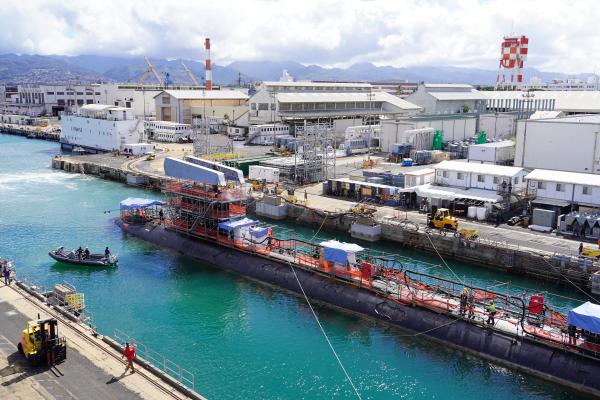
Hudson will welcome Senators Mark Kelly (D-AZ) and Todd Young (R-IN) to discuss their proposal to restore America’s shipping and shipbuilding industries to help deter Chinese aggression.
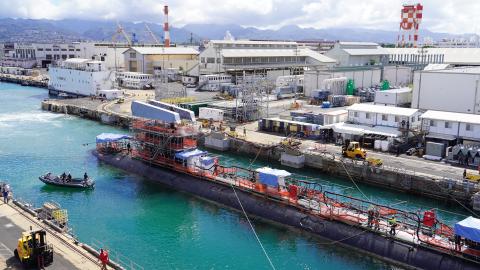

The Hudson Institute Political Studies Policy Certificate Program gathers talented early career professionals for advanced study of American foreign and domestic policy and national security, led by policy experts and experienced government officials.
